Ed Gorman's Blog, page 103
January 23, 2014
FORGOTTEN BOOKS: Killer by Dave Zeltserman
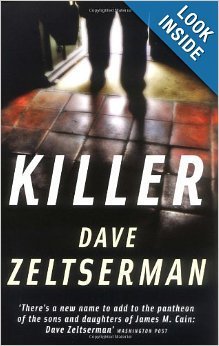
KILLER by Dave Zeltserman
Before I say anything about Dave Zeltserman's new novel I have to note that a) Dave is a friend of mine b) the novel is dedicated to me and c) somebody not unlike me makes a brief appearance in the book.
Leonard March is a mob hit-man who turns state's witness to avoid a lifetime in prison. Despite giving evidence he serves fourteen years and emerges a much older man and not just physically. People familiar with his case are amazed that his former employers didn't manage to have him killed while behind bars. And only now, as he emerges from prison, is the public told of just how terrible a man he is. His photograph is everywhere. He is a pariah. He is even dragged into court on civil charges instituted by the loved ones of some of the people he killed. The press, loving a good story, depicts the victims as good citizens even though they were scum just like March. His prison counselor arranges for March to work quietly as a janitor at nights so he can pay rent on a seedy apartment and buy a few groceries.
Several times while reading Killer I forgot I was reading a novel. The book has the feel of an autobiography. Laid out in alternating chapters of present and past we see March at virtually every stage of his life. His father, his mother, his wife, his children are vividly and vitally portrayed here. His quiet father was a blue collar worker whose sixty and seventy hour weeks led only to a melancholy cynicism about the capitalist system. March's wife's death by cancer while March is in prison is especially haunting. She and the children spurned him after the DA's office revealed that he was a hit man. March in his early twenties was a street punk who, despite his self-denials, savored the deaths he visited on his targets.
All the mob tropes are here to be sure. Sleazy stupid parasites who do with pistols and knives what Wall Street and others do with computers and fancy boardrooms. Zeltserman makes you feel each death and there are plenty of them.
But what you take away from the novel is not the mob melodrama but the rich details of March's life. Zeltserman forces the reader to grant March his intelligence, his occasional eloquence and the remorse he feels but cannot understand. In some respects the man who took all these lives is even more monstrous because he's not a psychopath--as he reminds us several times--but a man who has convinced himself that he's just doing a job. His painful love for the children who have deserted him; the last time he spoke to his dying wife on the phone, her laughing despite her enormous pain, always trying to keep everything "nice;" the young waitress who comes to like this "crazy old man" until she finds out who he is--and is then horrified and angry--grueling, perfectly realized scenes . And then then are the shopping scenes where March buys a new bed, sheets, towels, etc. to make his tiny apartment tolerable--the homeliness of the shopping and the cleaning he has to do is the kind of touch that gives the books its unique truth. You don't find many hit-men scrubbing bathtubs and buying used furniture.
These are just a few of the indelible scenes that make the book so fresh and powerful. Killer is a major novel of crime and likely the book that will win Dave Zeltserman a much wider audience.
Published on January 23, 2014 13:17
January 22, 2014
STEPHEN COLBERT'S BOOK CLUB DISCUSSES HEMINGWAY WITH MICHAEL CHABON. Hilarious.
STEPHEN COLBERT'S BOOK CLUB DISCUSSES HEMINGWAY WITH MICHAEL CHABON. Hilarious.http://www.colbertnation.com/the-colbert-report-videos/432344/january-21-2014/colbert-s-book-club---michael-chabon----a-farewell-to-arms-
Published on January 22, 2014 13:49
January 19, 2014
Free episode of "Episodes"
https://www.youtube.com/watch?v=5Sf36...
ABOUT THE SERIESMatt LeBlanc stars as Matt LeBlanc in EPISODES, the hilarious comedy series about remaking a comedy series. When husband and wife writing team Sean and Beverly set out to reproduce their British TV hit for an American network, all of their worst fears come true as Hollywood lives up to its reputation for absurdity. Not only does the network cast Matt LeBlanc in the starring role, but Matt takes the lead in deviously twisting their beloved series into a terrible cliché, while testing the couple's marriage with diversions and temptations.
ABOUT THE SERIESMatt LeBlanc stars as Matt LeBlanc in EPISODES, the hilarious comedy series about remaking a comedy series. When husband and wife writing team Sean and Beverly set out to reproduce their British TV hit for an American network, all of their worst fears come true as Hollywood lives up to its reputation for absurdity. Not only does the network cast Matt LeBlanc in the starring role, but Matt takes the lead in deviously twisting their beloved series into a terrible cliché, while testing the couple's marriage with diversions and temptations.Ed here: The best writing, the most devious plotting and flawless acting. You can catch it tomorrow night at 9:30 Central or right now see tomorrow night's show On Demand. I've already watched tomorrow night's episode three times. The introduction of a new boss is pure black comedy.
Here's a free episode from you tube which for some reason bleeped all the nasty words. A bit of background the Brit husband and wife fell apart when Matt LeBlanc falsely convinced her that her husband slept with the blonde bimbo star of the series. She decided on vengeance and slept with LeBlanc. But it turned out not to be true so the husband said they were over. They'd work together but no longer be husband and wife. In retaliation he slept with the bimbo. She reluctantly started seeing this hunk. She always asked her husband if it was all right to go, wanting him to stop her. But he wouldn't.
Carol is probably my favorite character. She was sleeping with her boss Merc, a hilarious boor she managed to fall in love with. He didn't know what he was doing so she secretly ran the network. Then the bosses dumped him and offered her the job but she wouldn't take it. Then Merc finally confessed that he wouldn't leave his blind wife because he couldn't afford the settlement. Carol throws him out of the car and frantically calls NY to take the job. Meanwhile Merc's beautiful blonde wife has fallen in love with LeBlanc.
This one isn't as dark or wily as the two episodes to follow but there some excellent moments and it gives you a sense of the show.
ABOUT THE SERIESMatt LeBlanc stars as Matt LeBlanc in EPISODES, the hilarious comedy series about remaking a comedy series. When husband and wife writing team Sean and Beverly set out to reproduce their British TV hit for an American network, all of their worst fears come true as Hollywood lives up to its reputation for absurdity. Not only does the network cast Matt LeBlanc in the starring role, but Matt takes the lead in deviously twisting their beloved series into a terrible cliché, while testing the couple's marriage with diversions and temptations.
ABOUT THE SERIESMatt LeBlanc stars as Matt LeBlanc in EPISODES, the hilarious comedy series about remaking a comedy series. When husband and wife writing team Sean and Beverly set out to reproduce their British TV hit for an American network, all of their worst fears come true as Hollywood lives up to its reputation for absurdity. Not only does the network cast Matt LeBlanc in the starring role, but Matt takes the lead in deviously twisting their beloved series into a terrible cliché, while testing the couple's marriage with diversions and temptations.Ed here: The best writing, the most devious plotting and flawless acting. You can catch it tomorrow night at 9:30 Central or right now see tomorrow night's show On Demand. I've already watched tomorrow night's episode three times. The introduction of a new boss is pure black comedy.
Here's a free episode from you tube which for some reason bleeped all the nasty words. A bit of background the Brit husband and wife fell apart when Matt LeBlanc falsely convinced her that her husband slept with the blonde bimbo star of the series. She decided on vengeance and slept with LeBlanc. But it turned out not to be true so the husband said they were over. They'd work together but no longer be husband and wife. In retaliation he slept with the bimbo. She reluctantly started seeing this hunk. She always asked her husband if it was all right to go, wanting him to stop her. But he wouldn't.
Carol is probably my favorite character. She was sleeping with her boss Merc, a hilarious boor she managed to fall in love with. He didn't know what he was doing so she secretly ran the network. Then the bosses dumped him and offered her the job but she wouldn't take it. Then Merc finally confessed that he wouldn't leave his blind wife because he couldn't afford the settlement. Carol throws him out of the car and frantically calls NY to take the job. Meanwhile Merc's beautiful blonde wife has fallen in love with LeBlanc.
This one isn't as dark or wily as the two episodes to follow but there some excellent moments and it gives you a sense of the show.
Published on January 19, 2014 14:34
The Phenix City Story
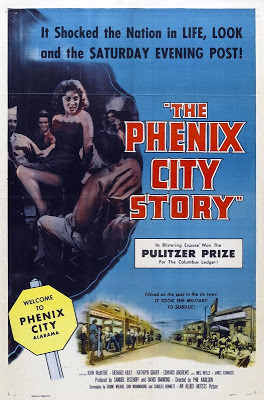 Ed here: Watched this yesterday. Really holds up. Sweaty gritty and very Erskine Caldwell Southern. Here's an excellent piece from Film Noir of The Week. Oh and by the way I forgot to mention that "Episodes" is on Showtime.Phil Karlson was never more than a B-movie director and he was proud of it. While working for Monogram Pictures the young director was paid $250 a week working on their film assembly line. In 1946, he churned out eight movies! Back then, movie companies like Monogram owned the movie theaters their films played in. This monopoly setup (later broken up) pretty much guaranteed that any B-movie -whether it was a western or crime film- Monogram churned out would turn a profit.
Ed here: Watched this yesterday. Really holds up. Sweaty gritty and very Erskine Caldwell Southern. Here's an excellent piece from Film Noir of The Week. Oh and by the way I forgot to mention that "Episodes" is on Showtime.Phil Karlson was never more than a B-movie director and he was proud of it. While working for Monogram Pictures the young director was paid $250 a week working on their film assembly line. In 1946, he churned out eight movies! Back then, movie companies like Monogram owned the movie theaters their films played in. This monopoly setup (later broken up) pretty much guaranteed that any B-movie -whether it was a western or crime film- Monogram churned out would turn a profit. Monogram was known for releasing cheap predictable movies (like the later Charlie Chan and Shadow movie series) that cost the company next to nothing to produce. Karlson, who began his film career working part time while going to law school fell in love with movie making. He worked his way up the ranks doing every movie job going from prop man to, after serving in World War II, film director. Eventually Karlson was put under contract by Monogram Pictures.
In the late 1940s, the chiefs at Monogram, wanting to make their brand appear more artistic to film goers and newspaper critics, began putting out bigger budget films under their new name Allied Artists. Karlson (who made AA's first “important” picture, Black Gold) was asked to begin making better (more expensive) movies. The Karlson-directed AA crime films released in the 1950s where far from being big-budget A films, but they were a long way from the 4 or 5 day movie shoots with no budget cheapies Karlson cut his teeth with. One of Karlson's best was one released in 1955, The Phenix City Story. True, Karlson churned out five movies that year for Allied Artists and Columbia Pictures, but this one stood out for its gritty realism due to the film being shot in the Alabama town during the same time the actual trial for the real-life killing was taking place.
The highly fictionalized story was based on fact. In 1954, in a series of events that no doubt reminded Karlson of his youth in Al Capone-era Chicago, became famous when reporters dubbed the Alabama town “Sin City.” Drugs were sold openly, prostitutes solicited johns on the street corners, and sleazy clubs offered gambling. Not seen by the citizens and army men from Fort Benning that visited the town for pleasure were other even more sleazy rackets including a safe-cracking school and a black-market baby ring. It wasn't until the state's attorney general elect – who campaigned with the promise that he would clean up the city --was murdered in 1954 did the citizens demand action against the criminal element. After the killing, the national guard was sent in and the major crime bosses fled. This was exactly the type of story that B-thriller semidocumentaries were made from. And it was -- the very next year.
for the rest go here:http://www.noiroftheweek.com/2008/05/...
Published on January 19, 2014 10:41
January 18, 2014
"Episodes" My favorite TV show bar none
ABOUT THE SERIESMatt LeBlanc stars as Matt LeBlanc in EPISODES, the hilarious comedy series about remaking a comedy series. When husband and wife writing team Sean and Beverly set out to reproduce their British TV hit for an American network, all of their worst fears come true as Hollywood lives up to its reputation for absurdity. Not only does the network cast Matt LeBlanc in the starring role, but Matt takes the lead in deviously twisting their beloved series into a terrible cliché, while testing the couple's marriage with diversions and temptations.Ed here: The best writing, the most devious plotting and flawless acting. You can catch it tomorrow night at 9:30 Central or right now see tomorrow night's show On Demand. I've already watched tomorrow night's episode three times. The introduction of a new boss is pure black comedy.
Published on January 18, 2014 11:50
January 16, 2014
The Dangerous Housewife: Santa Barbara's Margaret Millar by Kathleen Sharp A forgotten genius of noir. Los Angeles Review of Books
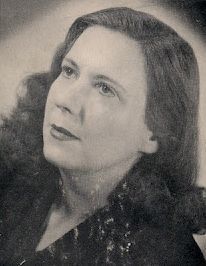
The Dangerous Housewife: Santa Barbara's Margaret Millar by Kathleen SharpA forgotten genius of noir. The Los Angeles Review of BooksNovember 28th, 2013thanks to Jake Hinkson for the link
WHENEVER A WRITER frets about balancing her work and family, or wonders whether her new book will finally get reviewed like a man’s, or whether it will get reviewed at all, I think of the brilliant novelist Margaret Millar and realize — it’s always been difficult.Perhaps you’ve heard of “Maggie” Millar. She’s a literary suspense author who, at the onset of World War II, explored female characters as they battled the daily accretions of frustrated ambition and blocked power, often while trying to keep a grip on their own sanity. Later, in the 1960s, Maggie’s perspective expanded, and she delved into the mores and corruptions of a stratified society that resembles our own today. She dissected the delusions of the Golden State at a time when the rest of the country still believed in the eternal sunshine of the Edenic kind. The people who lived in this paradise, and lived in Millar’s fiction, often reached far beyond their financial or moral means, playing dangerous games that pitted loved ones against each other. Sometimes, these people escaped the law, but they always wound up serving some sort of life sentence.Maggie, who spent much of her life in Santa Barbara, ranks among the best fiction writers of the late 20th century. She was a master of character, a genius of plot twists, and a superb stylist. It’s rare to find those three talents in one literary package, yet, over the course of a 55-year-long career, Maggie maintained her high standards throughout her 27 books, short stories, half a dozen screenplays, poems, radio stories, and one touching memoir. Plus, she did it while struggling to raise a child, keep a house, and deal with a husband who later became more famous than she. Perhaps you’ve heard of Ken Millar. He wrote under the pseudonym of Ross Macdonald and created the Lew Archer detective series, which paid homage to the hard-boiled detective masters Dashiell Hammet and Raymond Chandler, and he eventually joined them in that genre’s pantheon of men.Maggie was never included in that group, which annoyed her greatly. for the rest go here:http://lareviewofbooks.org/essay/the-...
Published on January 16, 2014 14:39
January 15, 2014
The Five Best Heist Films You’ve Never Seen WALLACE STROBY from Criminal Element
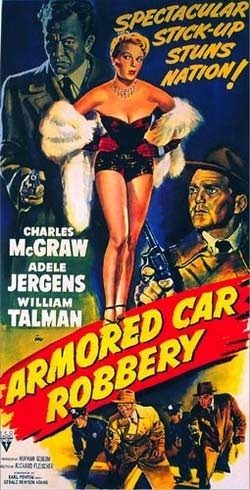
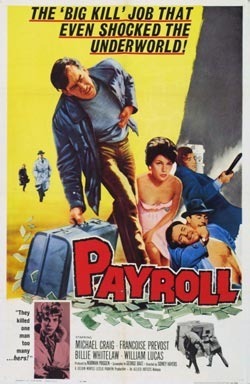
From The Criminal ElementThe Five Best Heist Films You’ve Never SeenWALLACE STROBYYou may know the classics of the heist genre—John Huston’s The Asphalt Jungle, Stanley Kubrick’sThe Killing, Jules Dassin’s Rififi, etc.(for an overview of the essentials, check out Jake Hinkson’s entries in “The Art of the Steal”). But there are plenty of other excellent heist films you may have missed. Take a look at five under-appreciated heist films that are nonetheless gems of the form, all available on DVD:1.) Armored Car Robbery (1950): A taut, violent action-melodrama that clocks in at a cracking 67 minutes. Richard Fleischer’s low-budget noir classic may have an unimaginative title, but it delivers on all fronts. A great lineup of character actors (including William Talman, Gene Evans, and Steve Brodie) play the heisters. On their trail is standby Charles McGraw as Lt. Jim Cordell, a cop so tough that his idea of comforting the wife of a newly slain partner is to utter this immortal line.With a suspenseful airport-set finale (predating The Killing by five years), wry humor, and great L.A. locations circa 1949 (including the original Wrigley Field and environs), Armored Car Robbery is one of the best Bs ever. Fleischer directed a handful of noirs (including The Narrow Marginand the similarly themed Violent Saturday), but this is his masterpiece.
2.) Payroll (1961) aka I Promised To Pay: Another armored car robbery, this one of a factory payroll in Britain’s gritty, industrial Newcastle-Upon-Tyne. After the heist goes sour and the driver is killed, his widow (Billie Whitelaw) plots revenge, eventually turning the gang members against each other. Veteran director Sidney Hayers helms a formidable cast of British stage actors, including Whitelaw (Hell is a City), and the great Tom Bell (Prime Suspect). Hayers directed the equally effective 1962 horror film Night of the Eagle (aka Burn Witch Burn), as well as several Avengersepisodes, before crossing the Atlantic for a long career in American TV. The 1960s were the Golden Decade of British heist movies, which also includedThe League of Gentlemen, A Prize of Arms, Robbery, and, of course, The Italian Job. One caveat for those on this side of the pond: the Region 2 Optimum DVD has no subtitles, and those faux-Geordie accents and rapid-fire slang can be hard to decipher.
for the rest go here:
http://www.criminalelement.com/blogs/...
Published on January 15, 2014 08:39
January 14, 2014
Saw "Used Cars" again last night so decided to re run this one: Jack Warden
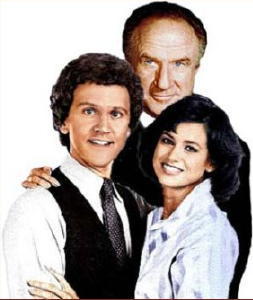
Monday, July 24, 2006
JACK WARDEN
Back in the days when I had my old blog, I noted the deaths of actors who’d given me hours of particular pleasure. Ted Knight, Robert Mitchum, Teresa Wright were among my favorites. We need all the momentary pleasures we can find in this vale of tears. And even though I didn’t know any of the people I bade goodbye, I felt the loss on an almost personal level.
Tonight I’m saying my goodbye to Jack Warden, certainly one of the two or three best character actors of his generation. While the movie sites are listing all the A+ movies he appeared in, I have my own list of his great performances –BYE BYE BRAVERMAN; USED CARS; SHAMPOO; THE SPORTING CLUB; THE APPRENTICESHIP OF DUDDY KRAVITZ, to name just a few.
And ... for true Jack Warden fans ... his CBS-TV Sunday night series Crazy Like A Fox. I know – it wasn’t The Rockford Files. It was TV-lite. But he made it wonderful. Carol and I would tape the shows so we could see them again the very next night. Just to watch him act. He was a wonderful comic actor as well as a powerful dramatic one. He had a particularly great line when his frustrated son told him that his office was a mess as was his life. Harry Fox: “Son, you gotta learn to rise above the details.” That is the wisdom I live by. I rise above the details every day.
Hours and hours and hours of Jack Warden dating back to the the mid-1950s and live TV. Never saw him phone one in or not know exactly how to inhabit the character. So long, Jack and thanks for all pleasure your immeasurable talent gave me.
—
Published on January 14, 2014 13:09
January 13, 2014
Excellent article on Bad Day At Black Rock

ANOTHER DAY IN BLACK ROCK
 Posted by Susan Doll on January 13, 2014 Movie Morlocks
Posted by Susan Doll on January 13, 2014 Movie Morlocks
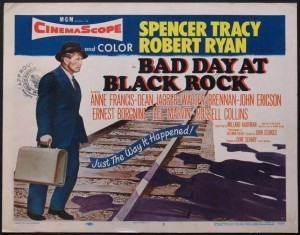
In most film history books, the advent of CinemaScope and other widescreen processes is attributed to the studios’ attempts to counter the rising popularity of television. Making the big screen bigger was one strategy to increase the level of spectacle in the movies, thereby luring audiences back to the theaters, along with color, stereo sound, and gimmicks like 3-D. Early films exploited widescreen by including casts of thousands, as in The Robe, or by shooting in beautiful, foreign locations, as in Three Coins in the Fountain.
Despite the spectacle of casts of thousands in period costume, historical eras recreated via huge sets, or postcard views of exotic locales, some directors had difficulties with widescreen. The academy format had been perfect for composing in depth, but widescreen was not. Also, close-ups, which are so important in drawing audiences into the emotion of a character or scene, could look clunky in widescreen. It took some directors and producers a few years to get the hang of it.
Of course, there are always exceptions. A few directors excelled at the widescreen format, mastering the art of composing for width and ignoring the trend for spectacle. On Tuesday, January 14, at 10pm, TCM will air Bad Day at Black Rock , one of my favorite CinemaScope movies. Director John Sturges eschewed the trend toward larger-than-life spectacle by offering a stripped-down drama set in an unappealing, dilapidated town with a minimal cast. Sturges did not need spectacle to make his film visually dramatic; he used composition and mise-en-scene. For those reasons, I selected Bad Day at Black Rock to show in my History of Film class this semester to represent the 1950s.
Most movie-lovers have probably seen Black Rock many times, because it airs frequently on TCM, but repeat viewers will make the perfect audience tomorrow night. Having fore knowledge of the story means you are free to direct more attention to the way the compositions enhance tone and meaning.
Spencer Tracy stars as John J. Macreedy, a one-armed veteran who arrives in the remote desert town of Black Rock, which hasn’t seen a visitor for a long time. Isolated, barren, and run down, Black Rock is the kind of town you leave, not deliberately visit. He is searching for a Japanese-American farmer from the area, but the townspeople are not only unhelpful, they are downright belligerent. As Macreedy tries to track down the missing farmer, he begins to realize that the inhospitable residents are hiding something. The dry, empty landscape almost overwhelms Black Rock, accentuating the town’s isolation and its age. The people are an extension of the setting: They look like hold-overs from another era; their lives are empty and their souls barren; and their isolation has made them out of step with the realities of the contemporary world. Though Bad Day at Black Rock is over fifty years old, its depiction of how a small town can atrophy without industry, commerce, and the re-invigorating power of diversity is relevant to the small towns across the Midwest suffering from the loss of industry.for the rest go here:
http://moviemorlocks.com/2014/01/13/a...
Published on January 13, 2014 14:31
January 12, 2014
When Hammett Met Chandler
Jacket CopyBOOKS, AUTHORS AND ALL THINGS BOOKISH
When Dashiell met Raymond, or the day Hammett met Chandler• • Comments 4 • • • Email • • • • • Share • • • 666 • • Tweet 71 This page has been shared 71 times. View these Tweets. • Like • 605
By Carolyn KelloggJanuary 11, 2014, 6:03 a.m.
Dashiell Hammett and Raymond Chandler, the two masters of classic noir fiction, met just once. That was 78 years ago today, Jan. 11, 1936, in Los Angeles.The occasion was the first West Coast get-together for Black Mask Magazine. A photograph taken at the end of the meal shows 10 pulp writers gathered patiently around the end of a table. Chandler and Hammett are both standing: Chandler has the pipe. Hammett, the tallest, is at the far right.Of the 10, it was Hammett and Chandler whose work would become the most enduring. But there was no way of knowing that at the time -- while both authors contributed to Black Mask, the two were at very different places in their careers.Hammett was the more successful, by far. He'd published his first Continental Op novel in 1929 and "The Maltese Falcon," featuring detective Sam Spade, in 1930. "The Maltese Falcon" wasn't yet a film, but his novel "The Thin Man" was. Released in 1934, it was a commercial and critical success. "The Thin Man" was such a hit that Hammett had been persuaded to come to Hollywood to help write the sequel.By comparison, Chandler was a novice. He'd published a half-dozen short stories and that was it. He was much less accomplished than Hammett, and on top of that, six years older. Chandler didn't begin writing until he was in his 40s -- and then only after getting fired from his job at an oil company.No wonder Chandler didn't make much of an impression on Hammett -- who, apparently, never bothered to write a word about him. http://www.latimes.com/books/jacketcopy/la-et-jc-when-dashiell-met-raymond-20140110,0,7730928.story#ixzz2qDO45sEc
Published on January 12, 2014 08:29
Ed Gorman's Blog
- Ed Gorman's profile
- 118 followers
Ed Gorman isn't a Goodreads Author
(yet),
but they
do have a blog,
so here are some recent posts imported from
their feed.



